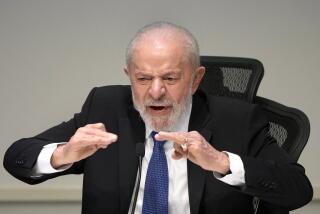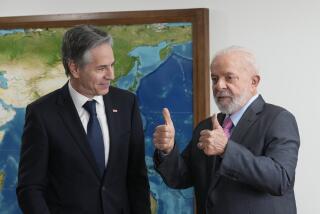Brazil’s New Leader Pushes for Direct Presidential Vote, With Cut in His Term
- Share via
RIO DE JANEIRO — President Jose Sarney, making good on a pledge to restore Brazil to full democracy, sent a constitutional amendment to Congress on Tuesday that would bring back direct, popular election of the president.
Sarney, presiding in Brasilia over the first meeting of his Cabinet since the death on April 21 of President-elect Tancredo Neves, also announced that he wants to reduce his presidential term to four years instead of the six provided under the present constitution.
His proposed constitutional amendment also provides for direct, popular election, in November, of mayors of state capitals.
Opposition Promise
At the insistence of the outgoing military government, Neves and Sarney were elected in January not by the people but by an electoral college. The opposition coalition that supported them promised that, in the future, public officials would be elected directly by the people.
Sarney became president with the death of Neves, who underwent repeated abdominal surgery starting on March 15, the day he was to have been inaugurated, and never recovered.
Sarney is believed to have dispelled much of the doubt within the governing coalition about his decisiveness by his personal call for reducing his term and by moving for early approval of the constitutional amendment opening the way to mayoral elections this year.
In what appeared to be a bid to develop popular support, Sarney also ordered the Cabinet to carry out rapidly an emergency plan involving food distribution to unemployed and low-income families, increased school lunch programs and expanded health services to mothers and infant children.
The immediate priority is in the northeast region, a nine-state area of almost 40 million people that is often seared by drought but this year has been hit by floods. An estimated 900,000 people are homeless there and farm production has been seriously disrupted.
“The first priority of this government is the poor,” Sarney said. He has promised to carry out in full the moderate social reform program that was identified with the candidacy of Neves, whose election ended 21 years of military rule in Brazil.
‘Audacity’ Required
Sarney told the Cabinet that the economic and social problems facing the new government required “audacity” in producing programs that will reduce inflation, now running at 220% a year, generate employment, feed the needy, boost farm production and service a foreign debt that stands at $100 billion.
The new government has been buffeted by a wave of strikes for higher wages involving about 400,000 workers. Production losses in the automotive industry due to strikes have made for losses in export earnings estimated at $250 million. Now, however, negotiations being promoted by Labor Minister Almir Pazzianotto have resolved most of the conflicts.
A more serious problem is the huge deficit in the federal budget and in the state-operated companies inherited from the previous regime. Minister of Economy Francisco Dornelles is scheduled to present the economic program to Congress today and is expected to report that there is now a deficit of $17.5 billion, in light of the government’s spending commitments for 1985.
Dornelles told the Cabinet that additional resources will have to be found and that spending will have to be reduced if inflation is to be slowed. Last month, consumer prices rose 7.2% after price controls were put into effect. In March, the increase was 12.6%.
Urgent Action
Each Cabinet minister made a brief report Tuesday on the situation in his area and, at several points, Sarney asked for urgent action.
The decision to eliminate the electoral college, a device created by the military to control presidential elections, and restore direct popular vote for his successor won Sarney widespread approval in the Congress.
More to Read
Sign up for Essential California
The most important California stories and recommendations in your inbox every morning.
You may occasionally receive promotional content from the Los Angeles Times.













